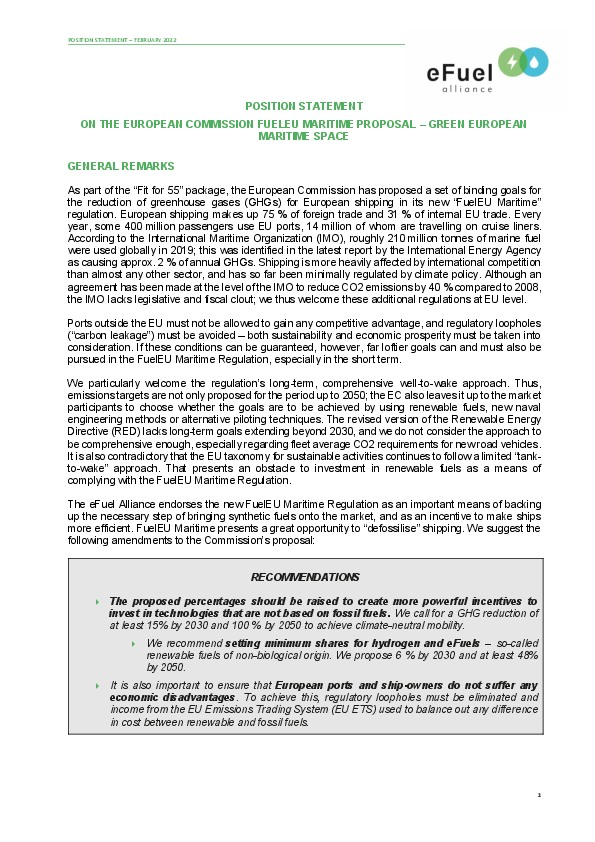Unsere Forderungen
an die Politik

Technologieoffenheit in der Klimaschutzpolitik.
Als eFuel Alliance sind wir davon überzeugt, dass ein technologieoffener Ansatz, der auch den Einsatz synthetischer flüssiger Kraft- und Brennstoffe fördert, volkswirtschaftlich am effizientesten und verlässlichsten ist. Nachhaltigkeit, Innovationen, Wettbewerb und Akzeptanz können so sehr gut miteinander in Einklang gebracht werden.Ganzheitliche Entwicklung einer Wirtschaft für Wasserstoff-Folgeprodukte in Europa.
Durch die Produktion und die Anwendung wasserstoffbasierter Produkte wie eFuels kann Europa global eine technologische Vorreiterrolle einnehmen und somit auch die Wettbewerbsfähigkeit des Industriestandortes Europa sichern. Dafür benötigt es passende Rahmen- und Nutzungsbedingungen. Es ist Aufgabe der Europäischen Union, ein ganzheitliches Vorgehen beim Aufbau der notwendigen Produktionsanforderungen und bei der regulatorischen Anerkennung, etwa von eFuels, zu garantieren.Umstellung der Energiesteuer.
Der positive Beitrag, den eFuels und nachhaltige Biokraftstoffe für den Klimaschutz leisten, muss bei der Energiesteuer berücksichtigt werden. Die Bemessungsgröße sollte anstelle des Volumen auf den CO2-Fußabdruck der Energieträger umgestellt werden. Wird die Energiesteuer auf umweltrelevante Bemessungsgrundlagen gestellt, führt das zwangsläufig zu einer Reduktion der Energiesteuer auf synthetische Kraftstoffe.Anrechenbarkeit auf CO2-Flottengrenzwerte.
Die Anrechnung von eFuels auf die EU-CO2-Flottenziele für Pkw, leichte sowie schwere Nutzfahrzeuge ist ein entscheidender Hebel für die Erreichung der Klimaziele im Straßenverkehr. Die durch eFuels erzielte Treibhausgas-Einsparung sollte daher unbedingt bei der Anrechnung auf die EU-CO2-Flottengrenzwerte berücksichtigt werden, um eine weitere Lösungsoption zur Klimazielerreichung zu schaffen.Internationale Zusammenarbeit zum Aufbau einer globalen Produktion stärken.
Mithilfe von eFuels kann global erzeugter Strom aus erneuerbaren Energien erstmals weltweit genutzt werden. Denn eFuels sind leicht speicherbar und transportabel und bieten so die Möglichkeit, erneuerbare Energien in Form flüssiger und gasförmiger Energieträger global herzustellen und zu importieren. Dies leistet einen entscheidenden Beitrag, die globale Energiewende umzusetzen und ein klimafreundliches Energiesystem auch in strukturell schwächeren Gebieten aufzubauen.Industrielle Produktion von eFuels fördern.
Durch die Unterstützung von Pilotprojekten soll möglichst schnell eine eFuel-Produktion im industriellen Maßstab erreicht werden. Auch mittels Ausschreibungsverfahren zur Investitionsabsicherung und Mengenzusagen kann ein Markthochlauf kurzfristig unterstützt werden.
Positionspapiere
Kontakt aufnehmen
Sie wünschen weitere Informationen zum Thema oder möchten ein Mitglied der eFuel Alliance werden?
Dann kontaktieren Sie uns direkt!



































